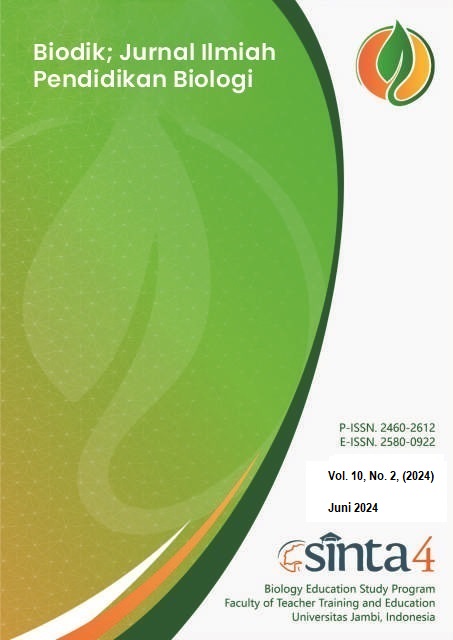Peningkatkan Kreativitas Dan Hasil Belajar Mahasiswa Melalui Model Pembelajaran Project Based Learning
(Increasing Students' Creativity And Learning Outcomes Through The Project Based Learning Model)
DOI:
https://doi.org/10.22437/biodik.v10i2.29762Abstract
Waste Management is one of the courses in the environmental health specialization. So far, the learning process in waste management courses has only relied on face-to-face methods (teacher centered learning), thus making students less active and creative and independent in understanding the problems and phenomena that occur. One learning model that can actively involve students and increase student creativity is Project Based Learning (PjBL). The aim of this research is to design and develop project-based learning and to increase student creativity and learning outcomes. This research was conducted at the Department of Public Health, Jambi University on fifth semester students specializing in environmental health with a total of 77 students. This research design is qualitative classroom action research. Data collection was carried out in the pre-cycle and cycle I and cycle II. The results showed that the average creativity of students in cycles I and II was 74.3%, flexibility 73.1%, welfare 79.2% and authenticity 81.6% and the average learning outcome for all groups was 83.2% .. Conclusion Based on the research results obtained, the execution of learning using the PjBL model in cycles I and II has gone smoothly, the creativity value of students has increased from quite creative to creative creative, the value of learning outcomes resulting from projects in cycles I and II has increased, the results of interviews with Students showed a positive response that with the implementation of the PJBL learning model, students were more active in asking questions and concentrating more during lectures.
Abstrak. Pengelolaan Limbah adalah salah satu matakuliah yang ada dipeminatan kesehatan lingkungan,. Selama ini proses pembelajaran dalam mata kulian pengelolaan limbahhanya mengandalkan metode tatap muka (teacher centered learning), sehingga membuat mahasiswa kurang aktif dan kreatif serta mandiri dalam memahami masalah dan fenomena yang terjadi. Salah satu model pembelajaran yang dapat melibatkan siswa secara aktif dan meningkatkan kreativitas siswa adalah Project Based Learning (PjBL). Tujuan penelitian ini adalah untuk merancang, mengembangkan pembelajaran berbasis proyek dan untuk meningkatkan kreatifitas serta hasil belajar mahasiswa. Penelitian ini dilakukan di Jurusan Kesehatan Masyarakat Universitas Jambi pada mahasiswa semester V peminatan kesehatan lingkungan dengan jumlah 77 mahasiswa. Desain penelitian ini penelitian kualitatif Tindakan kelas. Pengumpulan data dilakukan pada pra siklus dan siklus I dan siklus II. Hasil penelitian menunjukkan bahwa rata-rata kreativitas mahasiswa pada siklus I dan II adalah 74,3%, keluwesan 73,1%, merinci sebesar 79,2% dan keaslian 81,6% dan rata-rata hasil belajar semua kelompok 83,2%.. Kesmpulan Berdasarkan hasil penelitian didapatkan Pelaksanaan pembelajaran dengan model PjBL pada siklus I dan II sudah berjalan lancar, nilai kreatifitas pada mahasiswa meningkat dari cukup kreatif menjadi kreatif kreatif, nilai hasil belajar hasil proyek pada siklus I dan II sudah meningkat, hasil wawancara kepada mahasiswa menunjukkan respon positif bahwasanya dengan penerapan model pembelajaran pjbl ini mahasiswa sudah lebih aktif bertanya dan lebih berkonsentrasi pada saat perkuliahan.
Downloads
References
Ade Wena. (2010). Strategi Pembelajaran Inovatif Kontemporer Suatu Tinjauan Konseptual Operasional. Bumi Aksara.
Afifah A. N, Ilmiyati, & Toto T. (2020). Pengaruh Model Project Based Learning (PjBL) Dengan Pendekatan Stem Terhadap Penguasaan Konsep Dan Keterampilan Berpikir Kritis Siswa. J-KIP (Jurnal Keguruan Dan Ilmu Pendidikan, 1(2), 33–40. https://doi.org/10.25157/j-kip.v1i2.4400
Ahmadi, N., & Besançon, M. (2017). Creativity as a Stepping Stone towards Developing Other Competencies in Classrooms. Education Research International, 1–9. https://doi.org/https://doi.org/10.1155/2017/1357456
Harizah, D. T. D., Sumarmi, & Bachri, S. (2021). Pengaruh Model Pembelajaran Project Based Learning Terhadap Kreativitas dan Hasil Belajar Geografi Siswa. Jurnal Pendidikan: Teori, Penelitian, Dan Pengembangan, 6(8), 767–771.
Jusar I. (2017). Analisis Kebutuhan Modul Pembelajaran IPA Berorientasi Pendidikan Karakter Melalui Pendekatan Quantum Learning di Sekolah Dasar. Bioedukasi (Jurnal Pendidikan Biologi), 8(1), 26–32.
Kemendikbud. (2022). Mengenal Peran 6C dalam Pembelajaran Abad ke-21. https://www.kemdikbud.go.id/main/blog/2022/09/mengenal-peran-6c-dalam-pembelajaran-abad-ke21
Mhinxang Wu. (2018). Cultivating Student Creativity- A Qualitative Study of Outstanding Students of Yogyakarta State University. 8(1), 1–4. https://doi.org/DOI: 10.5923/j.edu.20180801.01
Mrayyan, S. (2016). Investigating Mathematics Teachers Role to Improve Students ’ Creative Thinking. American Journal of Educational Research, Vol 4 No 1, 82–90.
Nugroho, G. A., Prayitno, B. A., & Ariyanto, J. (2017). Peningkatan persentase kemampuan berpikir kreatif siswa dari level kurang kreatif menjadi cukup kreatif sehingga model Project Based Learning efektif meningkatkan kemampuan berpikir kreatif siswa. Bio-Pedagogi: Jurnal Pembelajaran Biologi, Volume 6, 9–12.
PISA. (2016). The Programme for Inter_national Student Assessment (PISA) Results From PISA 2015. Programme for International Student Assessment. www.oecd.org.edu/pisa/
Prasetya K Sarmini, & Nadiroh, U. (2018). Urgency of Increasing the Quantity and Quality of Student Creativity Program. Journal of Physics: Conference Series, 953(012193).
Saerozi. (2017). Pengaruh Model Pembelajaran Project Based Learning Berorientasi Ecopreneurship Dan Motivasi Terhadap Peningkatan Hasil Belajar Siswa Pada Materi Sistem Pengelasan Di Sekolah Menengah Kejuruan. Jurnal Pendidikan Teknik Mesin, Vol. 17, N, 43–49.
Soesilo T D. (2014). Pengembangan Kreativitas Melalui Pembelajaran. Ombak.
Downloads
Published
How to Cite
Issue
Section
License
Copyright (c) 2024 Fitria Eka Putri, Fajrina Hidayati

This work is licensed under a Creative Commons Attribution-NonCommercial-ShareAlike 4.0 International License.
Copyright Notice
Authors who publish with Biodik : Jurnal Ilmiah Pendidikan Biologi agree to the following terms:
- For all articles published in Biodik : Jurnal Ilmiah Pendidikan Biologi, copyright is retained by the authors and grant the journal right of first publication with the work simultaneously licensed under a Creative Commons Attribution-ShareAlike 4.0 International Licensethat allows others to share the work with an acknowledgment of the work's authorship and initial publication in this journal.
- Authors are able to enter into separate, additional contractual arrangements for the non-exclusive distribution of the journal's published version of the work (e.g., post it to an institutional repository or publish it in a book), with an acknowledgment of its initial publication in this journal.
- Authors are permitted and encouraged to post their work online (e.g., in institutional repositories or on their website) prior to and during the submission process, as it can lead to productive exchanges, as well as earlier and greater citation of published work (See The Effect of Open Access).
















